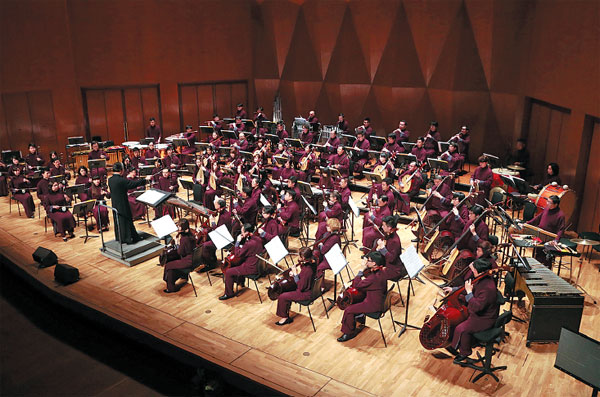Mix of old and new
By Chen Nan (China Daily) Updated: 2017-06-01 06:54An orchestra will tour the mainland to mark the 20th anniversary of Hong Kong's return to China, Chen Nan reports.
It was a tricky question: How could he promote traditional Chinese music in a Westernized city like Hong Kong?
That was the main challenge conductor Yan Huichang faced when he was appointed as the artistic director of the Hong Kong Chinese Orchestra in 1997. But Yan has found success over the past two decades.
From Friday to June 11, he will lead the orchestra on a tour of the mainland, including Beijing, Shanghai and Wuhan, to mark the 20th anniversary of Hong Kong's return to China.
It's the only professional Chinese orchestra founded in Hong Kong in 1977.
Its more than 90 musicians will bring a mix of ancient and contemporary pieces, including Zhao Jiping's Zhuang Zhou's Dream, Ng Cheuk-yin's Tang Resonating and Guo Wenjing's Sorrowful, Desolate Mountain.
Every concertgoer will be provided with a hand drum that can be used during the encore.
The audience will perform Chinese composer Cheng Dazhao's The Yellow River Capriccio with the orchestra.
"The orchestra performs on the mainland almost every year. The audience is familiar with us," says Yan.
He adds that the orchestra performed at the Belt and Road International Music Festival in Shenzhen in March, which gathered musicians from nearly 30 countries involved in the Belt and Road Initiative.
Yan graduated from the Shanghai Conservatory of Music in 1983 and conducted professional orchestras in Beijing, Shanghai, Taiwan and Singapore before joining Hong Kong Chinese Orchestra.
Yan says they present works by composers in Hong Kong at every recital, which is a way to display the East-meets-West culture of the city.
"We made efforts to let people know about the orchestra and get them involved in our events, especially the youth," says Yan.
The orchestra seeks to bring ancient Chinese culture closer to Hong Kong, he adds.
Mainland composer Zhao Jiping, who is known for his film scores, such as Red Sorghum, Raise the Red Lantern and Farewell, My Concubine, has been collaborating with the orchestra since the 1990s, thanks to his friendship with Yan.
Zhao said earlier the orchestra's rehearsals, concert themes and music seasons were of a "high standard" and "the best among all the orchestras specializing in Chinese music".
In the past two decades, the orchestra has not only given recitals regularly at concert halls, schools and community centers in Hong Kong, with an annual average of nearly 200 shows, but also has been involved in music education and the promotion of traditional Chinese culture.
To cater to the youth, the orchestra launched two platforms - the Hong Kong Children's Chinese Orchestra and the Hong Kong Junior Chinese Orchestra - in 2003.
Competitions on conducting, composing and instrument performances have been held by Yan's orchestra to discover young talent.
In 2001, the orchestra gathered 1,000 amateur erhu players from Hong Kong and recorded the largest number of people performing the two-stringed bowed instrument at the same time at a show titled Music From a Thousand Strings.
"Classical music is often regarded as high art. Many young musicians experiment in this field to develop the genre. Why not traditional Chinese music?" says Yan. "We not only want to preserve tradition but also be creative and offer new material to our audience."
Yan was born in a village in Heyang county in Northwest China's Shaanxi province to a family of farmers. Inspired by an older brother, who is a folk music lover, Yan learned a number of traditional Chinese instruments, such as the Chinese flute and sanxian (a three-stringed instrument), as a child.
At age 18, he enrolled to study at the Xi'an Conservatory of Music with a major in sanxian performance and later learned conducting.
In 1978, just after China restarted the national college entrance exam following the end of the "cultural revolution" (1966-76), Yan became the only student majoring in conducting at the Shanghai Conservatory of Music.
He was invited to join the Hong Kong orchestra by composer Peng Xiuwen, who was the guest conductor of the orchestra from 1981 to 1996.
Yan accepted the job because he wanted to learn with the maestro.
Peng was one of the founding figures of Chinese orchestral music, the combination of traditional instruments and a Western orchestral configuration.
Yan took the position as the artistic director of the orchestra after the maestro passed away in 1996.
Yan calls Hong Kong his second home. He says he didn't expect to stay on for 20 years.
"What makes Hong Kong unique is that, on one hand, it's a very modernized society; and, on the other hand, it is very traditional. That really inspired me and influenced the development of the orchestra," says Yan.
Contact the writer at chennan@chinadaily.com.cn
|
The Hong Kong Chinese Orchestra will perform across the mainland to celebrate the 20th anniversary of Hong Kong's return to China. Photos Provided To China Daily |
- 'Cooperation is complementary'
- Worldwide manhunt nets 50th fugitive
- China-Japan meet seeks cooperation
- Agency ensuring natural gas supply
- Global manhunt sees China catch its 50th fugitive
- Call for 'Red Boat Spirit' a noble goal, official says
- China 'open to world' of foreign talent
- Free trade studies agreed on as Li meets with Canadian PM Trudeau
- Emojis on austerity rules from top anti-graft authority go viral
- Xi: All aboard internet express












